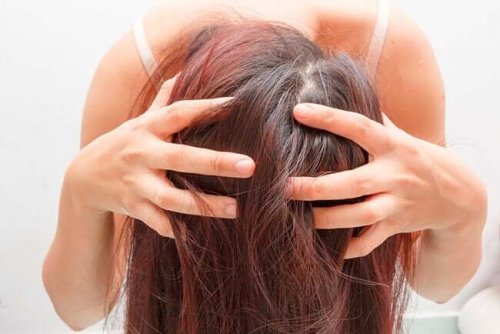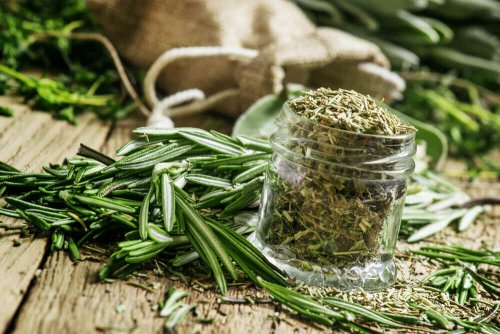Rosemary for Healthy Hair: Three Remedies

If you’ve never used rosemary for healthy hair, then you’re missing out on a great remedy to restore its shine and even treat scalp conditions. However, it’s never too late!
Check out these three great remedies.
The benefits of rosemary for healthy hair
Using rosemary to promote the health of your hair is one of the best choices you can make, as it has various properties.
As pointed out in one study, it stimulates hair growth. Also, rosemary has many other properties that can help when stress manifests itself as air loss or loss of density and dermatitis, for example. This is, in fact, one of the most common conditions among people. Plus, according to this study, this plant has antiseptic, healing, and stimulating properties for the scalp. Thus, it relieves wounds and helps them heal.

Rosemary remedies for healthy hair
Now that you know how rosemary can improve your hair, we’ll show you how to make a few remedies to make the most out of this plant’s properties.
1. Rosemary oil for healthy hair
Rosemary oil has many applications. However, the simplest way to use it is to massage it directly on your scalp, as it’ll help you prevent hair loss. You can either buy this product or make it at home.
Here’s how to make it at home:
- First, take the stems and needles of a rosemary plant and put them in a bowl.
- Then, fill the bowl with olive oil.
- Let it sit for a whole month in a dark and dry place.
- Finally, tale out of the closet and strain the oil.
As you can see, it takes a while to process this oil. The good news is you can always just buy it. Just make sure it’s 100% natural.
Read also: Discover the Uses and Benefits of Rosemary
2. Rosemary water
This second remedy is a lot easier to make, and you’ll be able to spray it through your hair after showering. It’ll help you untangle it. Also, it’ll help prevent hair loss, since you can apply it directly to your scalp.
- First, make a rosemary infusion by adding some rosemary to a pot of water and letting the water boil.
- Then, turn off the heat upon boiling and let it steep.
- Strain the water when it’s cold and put it in a spray bottle.

3. Rosemary tonic
You already know how to make rosemary oil and water. Next, you’ll learn how to make a rosemary tonic. All you need for this one is water and oil, which come together in a very powerful mixture that your hair will certainly notice.
- Boil two cups of water.
- Then, add 5 tablespoons of rosemary water and 10 drops of oil.
- Let it cool a bit, but don’t let it get too cold.
- Apply the lukewarm liquid to your scalp with a gentle massage.
This tonic will soothe your scalp, especially if it’s itchy due to dermatitis. Plus, it will also promote hair growth, strengthen the roots, and prevent excessive hair loss.
It’s important to be consistent
Because rosemary is a natural way to treat hair and scalp, you must be consistent to see its effects. Keep in mind that you should always be disciplined when it comes to treatments with creams, masks, and other products.
Also, we encourage you to try each of these preparations so you can find out which one you like best. Depending on your lifestyle, rosemary water might be a better option for you. Or, perhaps it’s the tonic that’s proved most effective in your opinion.
Have you ever used rosemary for your hair? If so, let us know! Perhaps you just discovered the solution for your dermatitis, hair loss or just the best way to keep your hair healthy!
All cited sources were thoroughly reviewed by our team to ensure their quality, reliability, currency, and validity. The bibliography of this article was considered reliable and of academic or scientific accuracy.
- Avila-Sosa R, Navarro A, et al. Romero: una revisión de sus usos no culinarios. Ciencia y Mar. 2011. XV (43): 23-36.
- Coy Barrera, Carlos Andrés, & Eunice Acosta, Gema. (2013). Actividad antibacteriana y determinación de la composición química de los aceites esenciales de romero (Rosmarinus officinalis), tomillo (Thymus vulgaris) y cúrcuma (Curcuma longa) de Colombia. Revista Cubana de Plantas Medicinales, 18(2), 237-246. Recuperado en 05 de junio de 2019, de http://scielo.sld.cu/scielo.php?script=sci_arttext&pid=S1028-47962013000200007&lng=es&tlng=es.
- Dentone, Sandra, & Morales Cauti, Siever. (2017). Determinación in vitro de la actividad antimicótica del aceite de romero (Rosmarinus officinalis) sobre Microsporum canis. Revista de Investigaciones Veterinarias del Perú, 28(1), 56-61. https://dx.doi.org/10.15381/rivep.v28i1.12932.
- González Minero F. J, Bravo Díaz L. Estudio botánico y farmacéutico de productos con aplicación cosmética y cuidados de la piel. Ars Pharmaceutica. Octubre-diciembre 2017. 78 (4).
- Martinello, M.A., & Pramparo, M.. (2005). Poder Antioxidante de Extractos de Romero Concentrados por Destilación Molecular. Información tecnológica, 16(5), 17-20. https://dx.doi.org/10.4067/S0718-07642005000500004
This text is provided for informational purposes only and does not replace consultation with a professional. If in doubt, consult your specialist.








